North Country Girl: Chapter 54 — California Nightmares
For more about Gay Haubner’s life in the North Country, read the other chapters in her serialized memoir.
A cute guy I had met at the Consumer Electronics Show had asked me to California for the Fourth of July, and since I had no other invitations to picnics or barbeques, I accepted, hoping an all-American holiday with a regular guy would give my life some semblance of normal.
Gerry picked me up from the Orange County Airport, kissed me, and said, “It’s my day to see my daughter, okay?” A visit to a hitherto unmentioned daughter had not been part of my California dreaming. In the next five minutes I found out that Gerry had been married, had a baby, and had accidentally dropped that baby. Baby’s head hit the floor exactly on that scary soft spot, squashing her brain. When the doctor told Gerry and his wife that their daughter would never be able to feed herself or wipe her own butt, Mrs. Gerry took a powder.
I had hoped that Gerry’s plans included taking me to Malibu or the La Brea Tar Pits, but instead we drove out into the endless acreage of suburbia, finally pulling up in front of a big brick house, the kind that gets repurposed as a funeral parlor, nursing home, or rehabilitation center.
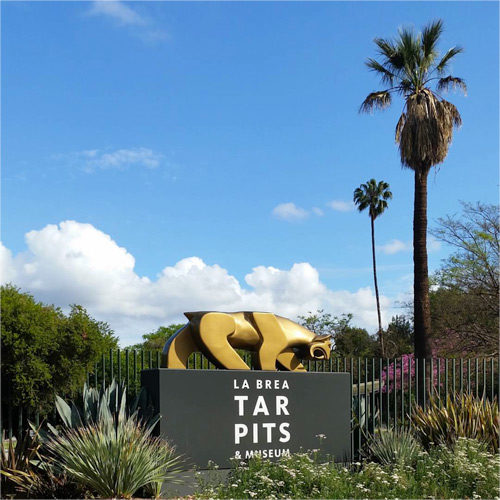
There was no waiting in the car for me. Gerry led me by the elbow inside, nodded at the white-capped receptionist, and pulled me down a blindingly bright hallway that looked sterile, but had an undertone of piss and puke and ammonia and bleach. We went through a door marked by a cut out picture of a grey kitten, and Gerry dropped my arm to swoop in and pick up his daughter.
You could say this two-year-old with her porcelain skin and Gerry’s starry blue eyes and golden brown curls was pretty, except other than the ability to hold her head up, she was as limp as a rag doll. Gerry cooed at her and kissed her and introduced me to her in baby talk.
“She’s always so happy when you come to see her, Gerry,” beamed the nurse who stood watch, I guess so that Gerry didn’t drop his daughter again. “And you’ve brought a nice new friend to meet her.”
The nice new friend smiled back at the nurse, wondering if she could spend the rest of the time in the ladies’ room and if it could possibly smell worse than the room she was currently in. I decided not to take the chance. I thought, “If this is his day with her, it must mean that the next two days are not.” I tried to reassure myself that I was still better off than if I were standing alone on the shore of Lake Michigan, straining my neck to catch a glimpse of the fireworks from Navy Pier, surrounded by decomposing fish.
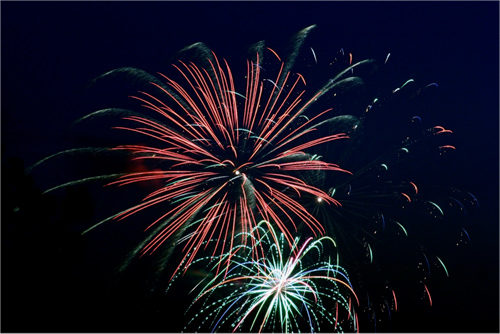
Gerry finally handed his daughter back to her nurse, and chirped at me, “What do you feel like eating?” For the first time in my life I had no appetite, but I was badly in need of a drink. I had several while Gerry enjoyed a cheeseburger and gossiped about his co-workers at Sanyo, none of whom I remembered.
I also had no appetite for sex, but thought, “Let’s just get it the hell over with and see what happens in the morning.” Gerry held me and kissed me and said, “You were so wonderful with my little girl. I feel like I can really trust you.” I made as noncommittal a noise as possible.
“Would you to do something for me? Would you tie me up and hit me with a belt?”
At this point nothing shocked me. But this just sounded like too much work. “I’m so tired from my trip. Can we talk about this tomorrow?” I now had quite a number of things I did not want to think about. I wished I were back in Chicago, sweating and drinking cheap beer with Frank.
The next day, the glorious Fourth, Gerry and I did go to a backyard barbecue, hosted by a couple who seemed perfectly normal. That night we oohed and aahed at the showers of glittering fireworks, sitting on the bleachers at the local high school. Gerry bought sparklers, and the two of us twirled them about, making patterns in the air. Anyone looking at us would think, “What a nice young couple.” That night, Gerry’s request took on a plaintive quality, like a kid asking for a lollipop. “Maybe you could scratch me, like just enough to leave a mark? If I bought you some black boots and red nail polish…”
I said, “I can’t Gerry,” went to sleep on the couch, and took a cab the next morning to the airport.
All the way back I banged my head on the airplane window, as if I could physically dislodge the memories of the past two days, finally settling on the minor consolation that since it was the Fourth of July holiday, this bizarre excursion had not cost me any modeling bookings.
Not that there was any work. There are no trade shows or conventions booked in Chicago when the temperature is a constant, daylong 95 degrees and the humidity is like a wet towel in your face. Ad agencies emptied out, and everyone took off on vacation to the cool greenery of Mackinaw Island or Door County. It was too awful outside for me to make my rounds of photographers. Showing up lank-haired, with running mascara and dark stains under my armpits would not get me cast in catalogs or commercials. I sat in Ann Geddes’ air-conditioned office and wailed.
“It’s like this every summer,” shrugged Ann. “After Labor Day, you’ll see, it will pick up again. Oh, Silver and I are going to Lake Geneva for the next two weeks.”
But last summer I had been living with James, who paid for the rent and the utilities and our once-a-week meal.
“ I need to work,” I said. “Isn’t there anyone who’s open, who’s hiring models?”
“There’s always Playboy,” said Silver. Ann gave him one look and gave me another.
Playboy was the great colossus that loomed over every Chicago model. On the one hand, Playboy was made of money: if they even agreed to look at your topless photos you were paid $500. Make it all the way to Playmate of the Month and you got a check for $25,000, which was more money than I could imagine. On the other hand, according to every model I knew, if you appeared in Playboy, even as a fully dressed background blur gazing adoringly at The Kind Of Man Who Reads Playboy while he gazed adoringly at his martini, you would never, ever again work for Ogilvy or Marshall Fields or Spiegel or Sears or any other client that valued their reputation.
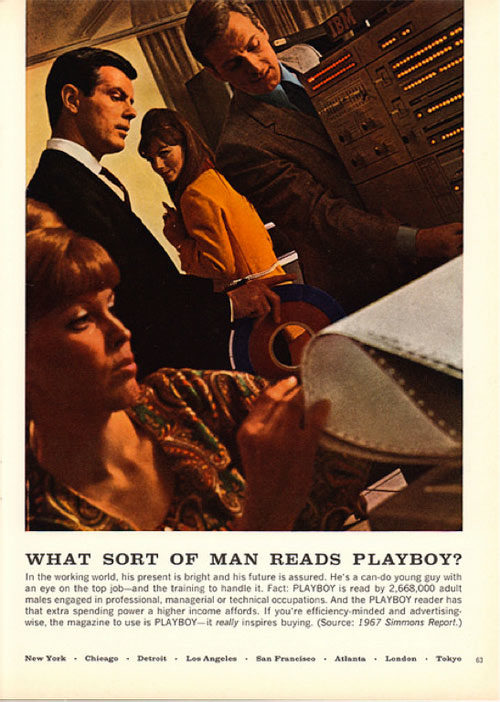
“’Cause there is something,” Silver went on. Playboy needed models for an orgy scene. A lot of models. “No one will be able to pick you out. They’ll pay $200 an hour, and with that many people it will take hours to shoot.”
Ann sighed and said, “It’s up to you, Gay.” I swallowed hard, thought of the tiny amount remaining in my checking account, and told Ann I would do it, I would risk my career, a long shot to begin with, and pose for the photo illustrating Dan Greenburg’s article, “My First Orgy,” a photo that also ended up on the cover of the September issue cut into the shape of a bunny head.
The Playboy building featured turbo-powered air conditioning, which felt delightful on the steaming hot day when I pushed the heavy brass revolving door into the lobby; the AC immediately whisked away the Chicago sweat. But it was arctic awful up in their huge photo studio where I stripped to down to nothing along with 29 other good-looking young people, at a five-to-one female to male ratio. I was grateful I didn’t recognize any of them, and no introductions were offered. We anonymous naked people were sent over to a vast stretch of black vinyl that had been pegged down on the floor. A funny bald man took over, running around us, arranging and re-arranging our nude bodies, while consulting a sheet of paper he held in his hand. “No, that won’t work,” he finally said. “Everybody stand up. We have to start over.”
I held my halter dress in front of my chest, wandered up to the bald guy in charge of the shoot, and peeked over his shoulder at a rough sketch of impossibly closely entwined bodies.
“You should arrange us so that we look like a bowl of fruit, a reverse Arcimboldo,” I said. He looked up at me. “I’m George, the art director. Do you smoke pot?”
“If I don’t have to do it naked,” I said, and slipped my dress over my head. George called a break and we snuck into a darkroom, along with the photographer and his assistant. It was very spacy pot, and made the rest of the day almost pleasant for me, as it took George hours to work our bodies into the right configuration. Silver was right: I ended the day $800 richer (minus Geddes’ ten percent).
George caught me as I was leaving. “Do you want to come to a party at my place tonight? You can wear clothes.” George scribbled his address on a piece of paper. It was 155 Burton Place. I lived at 40 Burton Place.
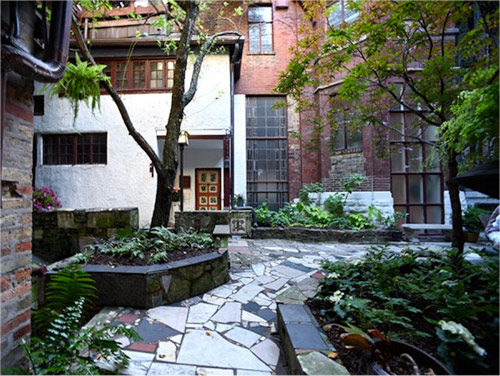
One-fifty-five Burton Place was hidden behind a pebbled wall studded with shards of multicolored tiles. An archway held an ornate black wrought iron gate, which was left ajar. I walked into yet another Wonderland, a Gaudi-inspired habitat, the two-story buildings stuccoed white and red-shingled, with ornate mosaics and stained glass windows. The apartments looked like mushrooms that had just sprung up around the cobblestone courtyard. There wasn’t a square edge in the place. Staircases curled around turrets and the dark wood doors were rounded at the top, with heavy medieval knockers. If Bilbo Baggins had owned a city pied-a-terre, it would have looked like a Burton Place apartment.
It was easy to find the door with the brass numeral 1. Boz Skaggs was blasting forth too loudly for a knock to be heard, so I let myself into a large living room, low-ceilinged with dark wooden beams, nubby orange sofas and ottomans, and dim lighting. Men and women were scattered about, no one over 35, everyone was drinking and smoking something.
George materialized. “It’s Gay, right?” I did have my stupid name necklace on as a reminder.
“Stick out your tongue.” George placed a small, gritty pill in my mouth and said, “It’s MDA — kind of like acid,” which was fine with me. Like Alice with her iced cake, I swallowed it.
Even with her clothes on, I recognized another model from that afternoon’s fake orgy and headed over to make modeling small talk. My way was blocked by a man with too much nose and not enough hair, wearing a pink bowling shirt with “Carl” stitched on the pocket, and the kind of black and metal eyeglasses the nerdy math boys in high school clung to after everyone else had moved on to wire rims. “I’m Michael Trossman, artist and resident wit. And you are…?”
Michael was an illustrator and lived in one of those Hobbit-like apartments. He backed me into a corner and held me captive there. He was cracking wise, keeping me amused, and then the drugs kicked in. “Wow,” I said. Michael grinned. “Don’t drink too much. I’ll get you a beer.”
Before my brain left the building, I made myself promise that I would not sleep with anyone at this party, despite the erotic feeling of oneness and love I suddenly had for all of them. It was Love Potion No. 9; I would have kissed a cop. A look around the room proved that everyone was feeling the same chemical bliss; couples were dancing, gazing into each other’s eyes, stroking faces and hair, preludes to a kiss and more. It was a real life version of the fake orgy I had been in that afternoon.
Michael, the guy closest to me — actually a little too close — was not my type: those glasses, that nose, his hairline in full retreat. But the psychic tendrils of MDA wove their way from him toward me, disturbing the air. Then through the fog of drugs and the buzz of sexual arousal, up popped the memory of Gerry begging me to hit him, and my libido shriveled up and ran away.
Michael picked up on this shutting of the bedroom door that the MDA had cracked open. He downed his beer and took a small step away from me.
“So you know George?” he asked. I nodded. I guess I knew George, having spent the day naked with him.
“He’s a great art director. The people who live here are artists and designers,” Michael said, and pointed out some of the other Burton Place residents: Ronny was a skinny French guy with long side-swept bangs, a photographer. There with his cute blonde girlfriend. Fred, a relocated California surfer, was an air-brush illustrator who had more work than he knew what to do with and a smiley, brown-haired wife who looked even more corn-fed Midwestern than I did. An older woman, the only person who was not out of her mind on drugs, was the architect’s daughter; she lived in the biggest, most Art Nouveau apartment. “It’s amazing,” said Michael. “She doesn’t invite too many people up, but if you like, I can get you in to see it. I did a charcoal drawing of her father; it’s hanging above the fireplace.”
I did not want to be alone someplace with Michael, nor did I want to commit to a future date. “Um, sure, yeah, that would be great,” I murmured, and changed the conversation.
Michael was 29, smart and funny, quick-witted, had read most of the books I had, had seen a whole bunch more movies, and could do dead-on impersonations. As the drug streamed through us, Michael fell into confessional mode. The folks of Burton Place had been throwing these MDA parties for months. Under the drug’s woozy influence, Michael had fallen in love and slept with Ronny’s girlfriend. When she broke it off, Michael fell in love and slept with Fred’s wife. He felt terrible about it — Fred and he were friends — and was trying to end the affair. “Look at her. Isn’t she beautiful?” Michael sighed, gazing at his beloved who was sitting on her husband’s lap. She had clear skin and shiny hair, I gave her that.
Now that I had gone from potential bedmate to good listener, Michael babbled on. His first and truest love was his ex-wife, an actress and comedian at Second City, whom he had knocked up while he was still a student at the Art Institute. Her ogre Irish parents demanded that Michael — even though he was that devil’s spawn, a Jew — make a daycent woman out of her and shot-gunned him to the altar. His son was born, and then another son (those crazy Catholics, I thought), who he loved more than anything on earth. “Then she divorced me,” sighed Michael, which threw the final wet blanket on any tiny glowing ash I may have felt for him.
Loose lips sink ships and they drive girls to put down their beer and stumble home alone on a night that was lit up by rainbows and stars and meteors, the drugs still coursing hot in my veins and clouding my mind. I might have been okay with the incestuous goings-on at Burton Place, but the divorce and the two kids were too much. The sidewalk wobbled beneath me as I walked the three blocks to my own front door, and a bed I shared only with my little dog Groucho, who seemed oblivious to the fact that the room was swirling about us.
North Country Girl: Chapter 53 — Hello Groucho, Good-bye James
For more about Gay Haubner’s life in the North Country, read the other chapters in her serialized memoir.
Even though I was working semi-steadily, I didn’t offer James money. It was never a relationship between equals; my piddling and erratic modeling checks for $90 or $225 would not have made a dent in his problems, only blasted out a hole in his pride.
I was stashing my get away money in case the worst happened, whatever that might be. Maybe James would rob a bank, or kill himself, or go back to selling Cadillacs in Des Plaines. When I moved in with James he was fun, generous, exciting. Now I was living with a hollow man and insanely hoping that the old James was not gone for good.
The market fell, and then continued falling. James turned into a zombie, a zombie who was now having trouble scraping up enough money to pay the rent. I came home one day to a pink “Late Payment” notice shoved under the door, which I placed on the coffee table; it went unmentioned and unmoved.
When James had cash in his pocket, it came from his backgammon winnings. The backgammon club was the only place James went at night; there were no more meals in nice restaurants or disco dancing at Faces. The last night I was ever there, I watched James distractedly pat at his pockets while asking his opponent if he would take his IOU. The winning player gently reminded James that the club did not allow IOUs, all bets were to be paid in cash or check. When James began lifting off his heavy gold chain, the man, whose only jewelry were onyx cufflinks, quickly demurred, murmuring, “Just this once.” After that I couldn’t bear to go back, and spent my evenings alone, pretending to be asleep when James got home, not wanting to know if he had won or lost.
At this point the stress unhinged me. I thought, “You know what will make things better, Gay? A dog,” though I had never had a dog in my life. I didn’t bother asking James, I just went to the closest animal shelter. It was filled with the sounds and smells of dogs, dogs who were locked away in row after row of cages, stacked to the ceiling, each dog looking more pitiable than the next. I was torn; they all looked so undesirable, all destined to be put down. A three-legged dog briefly stole my heart, before I saw the Dog Least Likely To Be Adopted: a hairless, toothless Yorkshire terrier with cataracts.
The pound guy told me that the Yorkie had been owned by an elderly woman who had barely been able to take care of herself and seemed to have completely forgotten that she had a pet; the dog, who would have been long in the tooth had they not fallen out from malnutrition, was recovering from a case of mange that left him mostly bald. I gave the pound guy $20 and he gave me the dog, who I named Groucho, along with a collar, leash and some canned dog food suitable for toothless dogs.
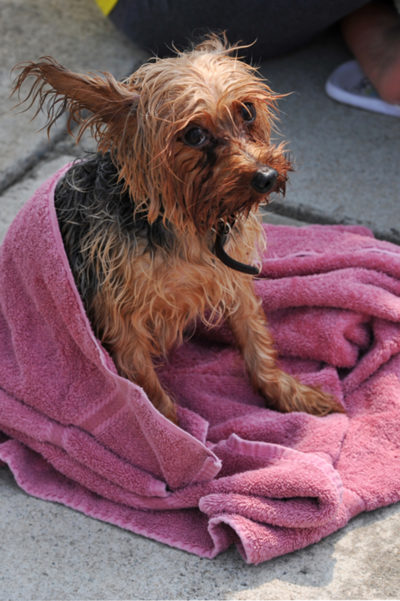
I guess Groucho had not been walked much; when I pulled on the leash, he lay down on his side so I had to drag him out of the animal shelter. I drug him a bit down the sidewalk, then realized I couldn’t do this all the way back home, so I picked him up and carried him. He weighed less than a loaf of bread.
James hated Groucho on sight, not that there was much to like. But Groucho may have been my guiding animal spirit sent to get me out of that awful situation. Pound guy had assured me that Groucho was housebroken; he did poop every time I took him out for a drag. But Groucho also pooped the second I left the apartment, varying where he left those little Tootsie Roll turds that James always managed to step in; if James made it safely out of the bedroom, there would be a tiny poop hiding in the white shag of the living room rug.
“This #$@%ing dog has to go,” James said. I agreed. I had to go with it.
My modeling career was puttering along well enough that I could rent a $140 a month studio, get the phone and electric hooked up, and furnish it from Goodwill.
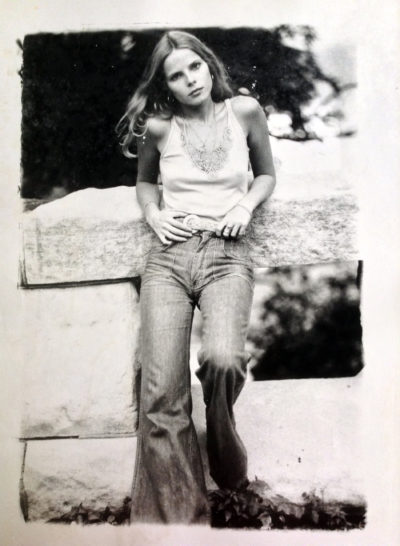
James barely noticed as I packed my clothes and books and Groucho; he was riveted to bottom part of the TV where the stock market ticker slid along with its tale of woe. There was no steamy last kiss, no tears. I pecked his cadaverous, stubbly cheek and said “Goodbye.” “See you around,” said James. But he didn’t. We lived a ten-minute walk apart from each other, yet I never saw him again.
Groucho and I moved into our tiny studio on quiet, leafy Burton Place. Every day when I came home, Groucho would be sitting on my second-hand bed, waiting for me, his tongue lolling out of his toothless jaws. He never pooped in that apartment once.
I was landing enough modeling jobs that I had stopped having nightmares about being locked in a coat check. Almost every other month I had a solid week of work at the Chicago Convention Center, handing out brochures at the Furniture Show, running a towel folding machine at the Hotel and Restaurant Trade Show, and at the Auto Show, luring prospective car buyers in range of voracious car salesmen.
Ford Motor Company loved me; I had that beamy, fresh, All-American look, the look of a girl who belonged in the passenger seat of a Mustang. When they hired me I was sure they would put me in a pretty gown and stand me up on a revolving platform next to their newest model, and all I would have to do is grin and wave.
The man from Ford looked at the bevy of models assembled in the basement of the Convention Center, pointed at me, and said “You. You’re gonna be the magician’s assistant.”
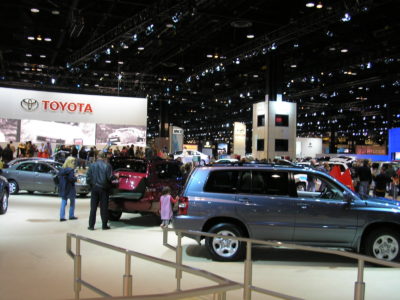
He did not see an innate talent for sleight-of-hand; he saw a girl small enough to disappear inside a magic box.
Every car company at the Auto Show had some kind of come-on. Ford had a fifteen-minute magic show, every hour on the hour that brought families into the exhibit and kept the kids entertained while the salesmen swooped down on the parents. I didn’t even get a cute, sparkly magician’s assistant outfit; I wore a plain jane blue dress with “Ford” stitched in white. I stood next to the magician on the postage-stamp-sized stage and handed him scarves and hoops and held his top hat. For the final trick, I stepped into a black box, which looked like an upright coffin. The magician closed the door on me and intoned a few magic words while I scrunched down as fast as possible into the bottom of the box, pulling three mirrored panels away from the back and sides so they encased me in a tiny triangular space. The magician opened the door for a split second, the mirrors reflected the interior’s matte black paint, and poof! I had vanished. Cue applause. I sprung up, the coffin door opened, and I stepped out to take my own quick bow before I headed back out to the convention floor to pass out “Free Show: The Magic of Ford!” flyers.
The next year Ford had a different gimmick: Models, dressed in those same plain jane blue dresses, buttonholed all the grown-ups who walked into the Ford exhibit and asked “Would you like to win $100?”
“What’s the catch?” every suspicious attendee wanted to know.
“No catch at all! Here’s a raffle ticket. Find someone with the same number and you’ll both win $100!”
For the ten days of the Chicago Auto Show the Ford exhibit was complete pandemonium, as people dashed about comparing raffle tickets. Gangs of kids picked up tickets that had been tossed on the floor or begged grown-ups for theirs, and ran riot, yelling numbers at each other and anyone holding a small piece of paper. It was supposed to be for adults only and then only one raffle ticket per person, but it didn’t matter, you could take a thousand tickets and not win.
The game was as rigged as any carny con, and I was the shill, dressed in civvies almost as homely as those dresses by Ford. It was designed to get foot-dragging buyers on to a car lot to close the deal. When one of the salesmen had a hot prospect for a Family Truckster, he sent someone out to find me. My job was to approach the potential car buyers, ask them to read the number on their raffle ticket and then squeal “Wow! That’s my number too!” I immediately handed my ticket to the salesman; the prospects never realized there wasn’t really a match; they were too excited about winning. But instead of a crisp $100 bill, what the suckers got was a certificate in that amount. The $100 was waiting for them at their local Ford dealership. Before they could complain, I would gush, “Oh thank you so much! I can’t wait to go to Skokie Ford and collect my $100!” Then I dashed off and hid in the crowd until the next set of chumps appeared.
Trade shows kept me in Campbell’s soup, Groucho in kibble, and paid the rent, but were anything but glamorous. I spent eight-hour days standing on a concrete floor, next to adding machines or surgical supplies, trying to ignore my throbbing feet, looking as cute and approachable as possible, which was ninety percent of the job. The other ten percent was passing out samples or pins or pens or brochures, and fending off amorous salesmen and conventioneers, “C’mon honey, it’s just dinner. Put a little meat on those bones!” I turned them down with a nice girl smile, and gently removed their hands squeezing for either meat or bones on my butt.
As much as I missed my brief former life of champagne cocktails and Dover sole, of being a regular in places where your drink arrives immediately and there’s a nice woman to hand you a towel in the ladies’, I had no desire to eat a chopped up steak at Benihana’s with the biggest manufacturer of stainless steel cutlery in America. I went home to soak my poor feet, heat up a can of tomato soup, and take Groucho out for a drag.
In June, the gigantic Consumer Electronics Show came to Chicago, taking over all three floors of the convention center and every trade show model in town. Sanyo hired me to pose next to a wall of car radios and lure buyers from Radio Hut and Pep Boys into the showroom. The guy in charge of the models taught us a few words of Japanese, none of which were useful in warding off the Japanese executives, who firmly believed that all of us models were hookers paid to entertain them, at the convention during the day and at their hotel at night.
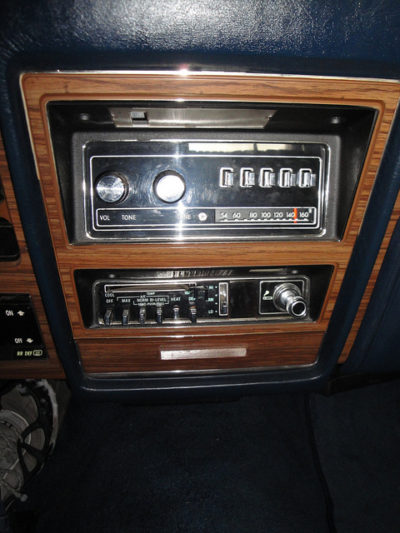
On my first day, I was rescued from one small, insistent Japanese man by an American in a well-cut suit, who took the guy aside and spoke to him in Japanese. The Japanese man glared and shook his finger at me, and I prepared to be fired on the spot. But he walked away and my rescuer came over to talk to me.
“Sorry,” he said. “These guys have already been set up with girls, but Mr. Moto really likes you. I can’t promise he won’t be back. I’m Gerry,” and he stuck out a small, delicate hand. “When’s your break? Can I buy you a sandwich?”
Gerry was just a few inches taller than me and as adorable as a cocker spaniel; he looked like a human Rowlf the Dog from the Muppets. He had soft curly brown hair that he wore just long enough to be hip and a funny little matching mustache that I knew would tickle. His eyes were a startling sky blue, innocent, almost transparent. I wanted to take Gerry home, put him on the couch next to Groucho and snuggle and pet the two of them.
Gerry wasn’t a salesman, he was an engineer who had come along on this Chicago junket in case a buyer had a difficult technical question about a car radio, which never happened, so Gerry just hung around the Sanyo exhibit, looking at me. I looked back and we both smiled.
A sandwich in the basement of the Convention Center turned into evenings out in those wonderfully expensive Chicago restaurants I had been missing. Sanyo gave Gerry a generous expense account, which he spent taking me out to dinner, after making sure that all the Japanese execs were happily set up with their hookers.
“Do not date guys you meet at the conventions,’’ my agent Ann had warned me. “It’s unprofessional and when it ends, poof, you’re out a client.” But Gerry was young and cute and I was tiring of Campbell’s tomato soup. I insisted that he not talk to me during the day, and after dinner I made him come to my apartment. I did not want to run into my Japanese suitor at the Hilton or have to do the El ride of shame at dawn.
Gerry was twenty-eight, and from California, which I thought automatically made you cool. He was funny enough and smart enough and smitten with me, which I always find attractive. He was a born tinkerer, one of those kids who reads Popular Mechanics cover to cover and takes apart every electrical appliance in the house. After being hired by Sanyo, he decided on his own to learn Japanese. Gerry taught me several interesting Japanese curses then warned me never to use them within earshot of the Sanyo executives. (I wish I could remember how to say, “You are a man who has to buy a sheep to service your wife” in Japanese.) The best part was that after five days, Gerry went back to California, leaving Groucho and me with a nice assortment of doggie bags from fancy restaurants.
I was pleased but not surprised when Gerry called to invite me to California for the Fourth of July. Summer is Chicago’s second worst season, when the sodden heat rolls off Lake Michigan accompanied by the smell of alewives, their fishy life cycle complete, dying and rotting by the millions on the shore. My sweet little studio was stifling; I would have gone anywhere that wasn’t a hundred degrees. The one girlfriend I had made, a model I met in an “Acting for Commercials” class (we bonded when we found out that the lech of a teacher had offered both of us free private tutoring, sessions that were very hands on) had married and moved to the suburbs. I didn’t want to spend the Fourth drinking cheap beer in Frank the photographer’s loft, which was as un-air-conditioned in the summer as it was unheated in the winter. I was hot and sticky and lonely.
I wasn’t in love. I wasn’t bedazzled as I had been with James. But I liked Gerry: he was cute, he made me laugh, and was okay in bed. So I said yes and Gerry sent me a ticket. I dozed on the plane out to California, dreaming of devouring hot dogs and hamburgers on the beach, gazing out at my old friend, the Pacific Ocean, and cuddling on a blanket with Gerry as a million fireworks exploded above our heads: a perfect Fourth of July.